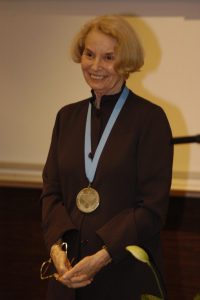2004 Thomas Wolfe Prize: Ellen Gilchrist
 “To say that Ellen Gilchrist can write is to say that Placido Domingo can sing. All you have to do is listen,” Jonathan Yardley, book critic for the Washington Post, wrote in praising the author’s second story collection Victory Over Japan, for which she won the 1984 National Book Award. Gilchrist, already a mother of three, who had previously published two volumes of poetry, did not begin writing fiction until she was forty. Her 1981 debut collection of stories, In the Land of Dreamy Dreams, appeared the same year that her first grandchild was born. Since then, she has written an inspired and phenomenal eighteen more books: six novels, eleven more short story collections, and the personal narratives gathered in Falling Through Space that first aired as a series of commentaries on National Public Radio’s “Morning Edition.”
“To say that Ellen Gilchrist can write is to say that Placido Domingo can sing. All you have to do is listen,” Jonathan Yardley, book critic for the Washington Post, wrote in praising the author’s second story collection Victory Over Japan, for which she won the 1984 National Book Award. Gilchrist, already a mother of three, who had previously published two volumes of poetry, did not begin writing fiction until she was forty. Her 1981 debut collection of stories, In the Land of Dreamy Dreams, appeared the same year that her first grandchild was born. Since then, she has written an inspired and phenomenal eighteen more books: six novels, eleven more short story collections, and the personal narratives gathered in Falling Through Space that first aired as a series of commentaries on National Public Radio’s “Morning Edition.”
Ellen Gilchrist was born in Vicksburg, Mississippi. She majored in philosophy and received her Bachelor’s degree from Vanderbilt University. Later she took writing classes from Eudora Welty at Millsaps College in Jackson, Mississippi, and also studied creative writing at the University of Arkansas in Fayetteville, where she currently teaches.Her twenty-third book-about her experiences teaching creative writing-will be published in the spring. Ellen Gilchrist was born in Vicksburg, Mississippi. She majored in philosophy and received her Bachelor’s degree from Vanderbilt University. Later she took writing classes from Eudora Welty at Millsaps College in Jackson, Mississippi, and also studied creative writing at the University of Arkansas in Fayetteville, where she currently teaches. Her twenty-third book-about her experiences teaching creative writing-will be published in the spring.
Gilchrist’s critically acclaimed fiction has enjoyed wide readership, resulting in the 2000 publication of her collected stories, selected by the author herself and an excellent introduction to such a prolific writer (Ellen Gilchrist: Collected Stories). Her body of work is consistently funny and urbane, but its greatest distinction is that in book after book the author returns to her most provocative characters so that their lives are ongoing and continue to evolve. Her favorite themes include familial love and loss; power struggles between the young, the old, and the restless; reckless passion; and the chameleon nature of happiness. Her most endearing characters are women, and they are willful, idealistic, tricky, innovative, eccentric, and resilient. As one critic has written: “Her heroines embody the unique perspective of southern women: that femininity and self-reliance are not in contradiction.”

